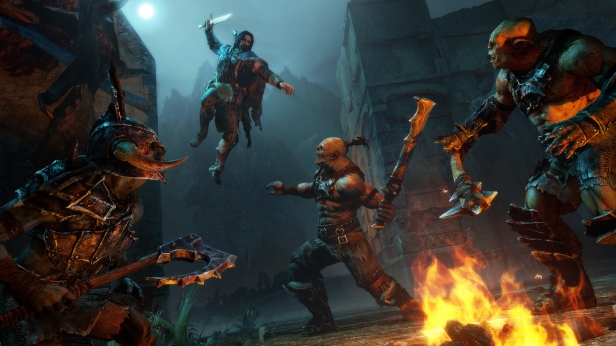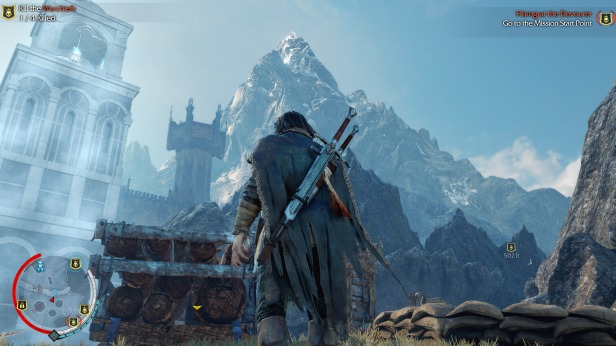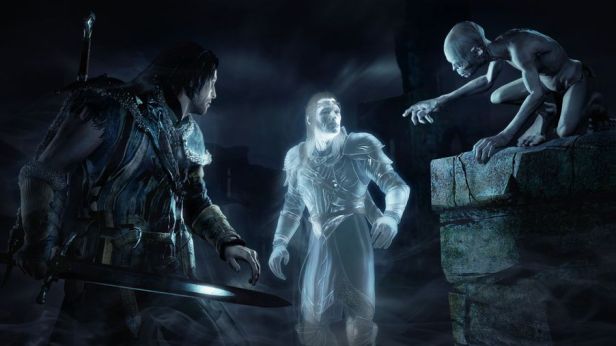Something stirs in the East. A sleepless malice. Mordor is yours for the taking.
Videogames based on J.R.R. Tolkien’s legendarium have an unfortunate tendency to be middling at best. Previous attempts have been beholden to the events Peter Jackson’s film adaptations of the Lord of the Rings, with 2004’s RPG The Lord of the Rings: The Third Age seeing a gang of Fellowship knock-offs shadowing the events of the films, and The Lord of the Rings: Conquest offering up shoddy recreations of famous celluloid battles. Middle-earth: Shadow of Mordor developers Monolith have taken a brave step into the land of shadows, carving a new story into the sixty year gap between the events of The Hobbit and The Lord of the Rings, and have created what is arguably the best game set in Tolkien’s mythology since the film tie-in The Lord of the Rings: The Return of the King.
You are Talion, a Gondorian Ranger stationed at the very precipice of the evil realm of Mordor who’s recovering from having reluctantly played the part of the lamb in a blood sacrifice carried out by lieutenants of the dark lord Sauron. The dark ritual goes awry, however, and a half-dead Talion is saved from oblivion when the wraith of an amnesiac Elf chooses him as a host. Finding himself imbued with a terrifying set of supernatural powers and a new lease of life, Talion embarks on a bloody vendetta across the black land to avenge the death of his family, while discovering the secrets of his mysterious Elven companion.
Upon starting Shadow of Mordor, I thought I’d be immediately infused with the swashbuckling, death-defying heroics of The Lord of the Rings’ badass Rangers such as Aragorn and Faramir. I confronted the first group of Orcs and Uruks in the game whose heads looked like they were practically begging to be liberated from their bodies. It was here, hopelessly out of my depth, that Talion became a sheath for so many blades. I fumbled around trying to counter attacks coming at me from slavering nightmares with names like Lûga the Butcher and Ûggû the Cannibal, but all in vain as I was cast down, and my enemies smote my ruin upon the mountainside.

This is what it looked like in my head.
Every Uruk Captain who joined in on my rather unceremonious lynching received a power boost. This was my introduction to the Nemesis System, which generates new foes who will remember you and return to take revenge if you ‘kill’ them in combat – and on the other hand, they’ll also grow in power if they can kill you, the fabled Gravewalker. As such, the game can initially feel quite unforgiving, though swiftly pirouettes into a rewarding experience if you take the time to study your environment, your enemy, and the different tactics you can use to accomplish your goals and punch evil in the face.
Shadow of Mordor’s gameplay is heavily indebted to that of Assassins Creed – with free-running, parkour, and stealth all essential and delicious ingredients – and Batman Arkham Asylum’s rhythm-based combat system being implemented. The execution is simple, yet a nuanced depth reveals itself as you develop new abilities and upgrade your weaponry. Features such as ‘Forge Towers’, ghostly landmarks that Talion can climb to reveal sections of the map, feel like they’re retracing well-trodden ground in open world games, but the freedom with which you can approach your missions and free-roaming sets Shadow of Mordor apart from tired conventions of its spiritual forebears.
Stalking evil in its own dojo, you can carefully craft death traps for your nemeses while remaining a silent shadow. Invading Orc strongholds, silencing lookouts, and then hunting your quarry from the darkness carries a sadistic glee, like you’re enacting a nightmarish Home Alone. In another nod to the Arkham games, your ‘wraith vision’ highlights enemies and points of interest to help plan out the path of least resistance – or most destruction. As your powers develop, you can cause massive explosions to take out large bands of Orcs in one blistering instant, shoot insect nests to unleash a miniature plague, and break the constraints of monstrous Caragors to see your enemies eaten alive.
 There’s some beautiful scenery to behold, and the open world isn’t so huge that it becomes overwhelming.
There’s some beautiful scenery to behold, and the open world isn’t so huge that it becomes overwhelming.
Orc politics are quite fascinating; Warchiefs sit atop Mordor’s hierarchy, with Captain bodyguards protecting them from harm but also secretly plotting to jump up into their coveted top spot should a certain ranger/wraith off their master. Later in the game, you can ‘brand’ your enemies to manipulate them into doing your dirty work for you. This spectral Elf trickery can cause infighting can draw the enemy’s gaze away from your shadowy shenanigans, while branding those closest to stronger adversaries presents the opportunity to ambush Uruk leaders with overwhelming odds.
Completing side missions and fetch quests will further develop Talion’s unnatural abilities, and it’s wonderful to discover that they’re actually quite fun to do. The mysterious Elf occupying your would-be corpse will re-enact ‘legends’, former accomplishments from his half-remembered life that, when completed, increase the infamy of your weapons. By sword, bow, or dagger, your enemies will know and fear your weapons as you inscribe more runes that tell the tales of their devastation into their surface.
It’s surprising just how interesting Mordor can be. The films granted us ominous long-shots of the black land, with Sauron the Deceiver’s dominion presented as a dim place full of volcanic rock, ash, smoke, and legions of foul servants of the dark lord. Taking place after Sauron and his Nazgûl’s defeat at the fortress of Dol Guldur, but before the War of the Ring and Frodo Baggins’ perilous mission to destroy Sauron’s most terrible and precious possession, the dark lord’s influence is just beginning to spread over the land. Human slaves are littered across the map, with small bands of freedom fighters working to dent Sauron’s grip on Middle-earth from the inside. Some of Mordor is still lush and green, with flora in abundance and a sky not yet blotted out by the pollution of industry and evil.
And to call back to the Nemesis System, it’s very unlikely that the Captains who you’ll battle across Mordor will be faced by any other player. Procedural generation means your enemies are made up on the fly, and it’s always interesting to see what unique horrors claw their way out of the bowels of Udûn and Núrnen to replace and avenge their slain predecessors.
 Gollum, once a Hobbit but corrupted over hundreds of years into a wretched and disturbing life form by the One Ring, appears to help or hinder your quest in the land of shadows.
Gollum, once a Hobbit but corrupted over hundreds of years into a wretched and disturbing life form by the One Ring, appears to help or hinder your quest in the land of shadows.
Developer Monolith take licence with new creatures, people, and areas, and creating fleshier back stories for places and characters barely touched upon by Tolkien. Purists may take issue with some elements of the story which step on the toes of established lore and events, but the execution may excuse it – as well as the fact that we still seem to be living in Peter Jackson’s more concise film universe.
On the other side of the coin, the game is steeped in lore and references to the vast history of Middle-earth, which may prove a little daunting for newcomers to the series. Gollum stalks the plains of Udûn in pursuit of clues about the whereabouts of his Precious, the history of the Rings of Power is explored in great detail, and the politics and allegiances of different lands, races, and characters aren’t quite as black and white as they are in the films. However, the ability to discover artifacts that reveal more about a bygone age where the original big bad Morgoth and giant demonic spider pal Ungoliant terrorised the free peoples will be exciting for long-time fans clamouring for more context to events prior to The Lord of the Rings.
Middle-earth: Shadow of Mordor is incredibly compelling, with a captivating open world that never feels overwhelmingly huge, nor devoid of life and things to experience. You may find yourself growing fond of a nemesis who keeps defying death, bandages masking the vengeance that has raged in his eyes since you last left him for dead. You’ll cheer on and come to the aid of your personal army of brainwashed monstrosities, who will fight and die at your beck and call. The thrill of felling a mighty Graug or riding a Caragor through the ranks of the Black Captains doesn’t dissipate, nor the rush as you infiltrate fortresses and either turn your enemies into friends or blow the bastards sky high. The last couple of missions may feel a little anticlimactic in defiance of expectations, but such a rich tapestry is woven through the rest of the journey that it’s hard to feel cheated.
One simply walked into Mordor, and it was great.
9/10
Middle-earth: Shadow of Mordor
Release Date: Out Now
Developer: Monolith Productions
Publisher: Warner Bros. Interactive Entertainment

I like the idea behind this game and all the “Lord of the Rings vibe”, but i didn’t liked the game at all. I found it a bit boring and empty
LikeLike
What do you think to Shadow of War? It definitely looks like it’s going to make things a bit busier.
LikeLiked by 1 person
It looks pretty interesting to me! I hope it will have a better open world this time
LikeLike